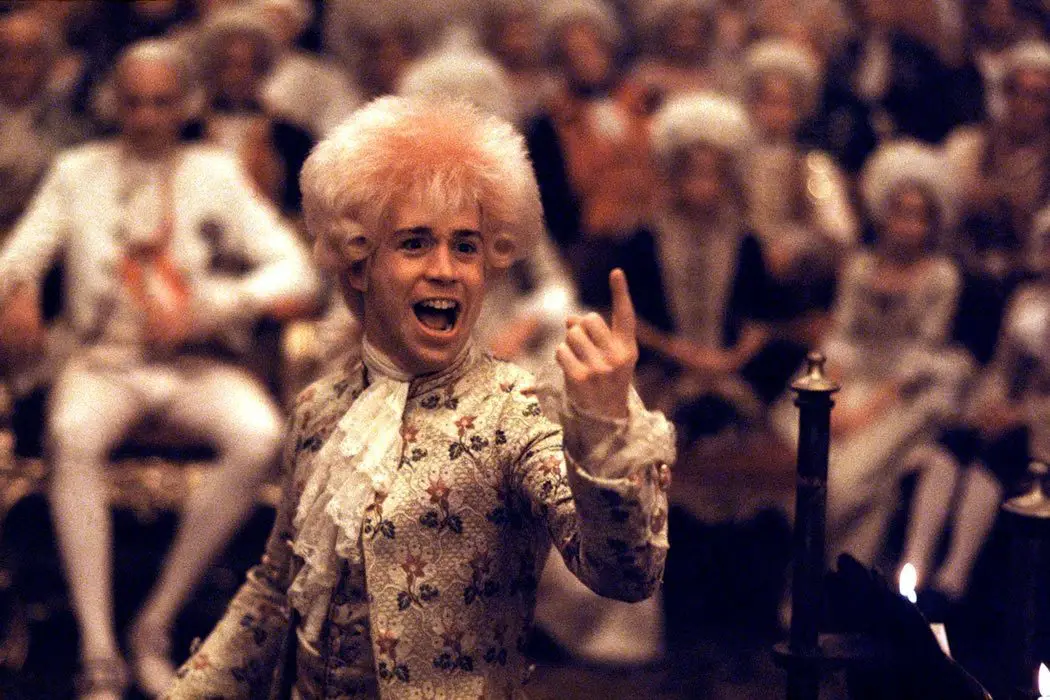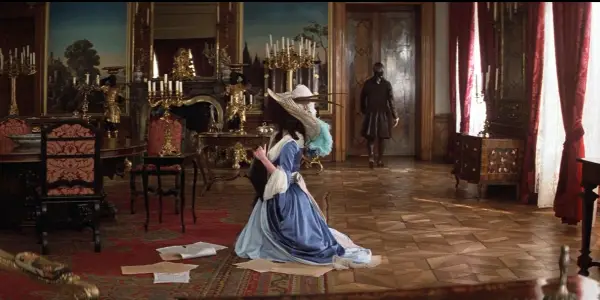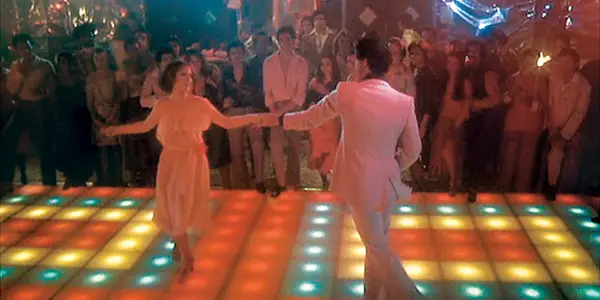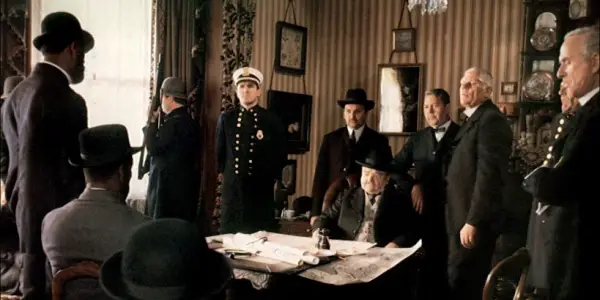Interview With Oscar-Winning Production Designer Patrizia von Brandenstein

Film student and enthusiast from Wisconsin. Lover of films of…
Few people in the history of Hollywood have had quite the career Patrizia von Brandenstein has. From designing John Travolta‘s iconic white suit in Saturday Night Fever to winning an Academy award for the art and set direction of the great masterpiece Amadeus, von Brandenstein has been a silent warrior of the Western cinema.
This year, Patrizia von Brandenstein was honored at the annual TCM film for her undeniable and often overlooked effect on some of America’s favorite films. I was honored to talk with her about her long-lasting relationship with the great Miloš Forman, her optimistic view of Hollywood’s future artists, and more.
This interview has been lightly edited for clarity and conciseness.
Jackson Stern for Film Inquiry: I wanted to start by saying congratulations on your being honored at this year’s TCM Film Festival!
Patrizia von Brandenstein: Well, it’s a thrill for me, thank you very much.
I wanted to start by addressing how Amadeus, a film which won you the Academy Award for Art and Set direction in 1985, turns 40 next year. I wanted to ask how the success of that film affected your career moving forward and if its success ever intimidated you?
Patrizia von Brandenstein: It certainly was the best thing that happened to me, career-wise, because I was a woman who lived on the East Coast and had done independent film and I was just fortunate enough to have gotten this job, and I knew everybody connected to this thing. I had worked with Miloš [Forman] before in Ragtime, where I was an art director, so it wasn’t an unknown world. But I had not production designed anything major, on this scale, before… certainly not in The Czech Republic, then called Czechoslovakia. So, how it affected my career was fabulous.
As far as intimidation, no, I don’t think so. I don’t think I was worried about the work itself because, strangely, I had a job earlier, I had offered to be a stage designer in those days, and I had worked for a school called Manhattan School of Music, for singers and operas, dancers and musicians, in the outer reaches of Manhattan. And because they produced a great many operas in those days, I had designed most all of those operas, and I knew the music very, very well so I had that background.
Now, no one knew this but I did know that. But I do think that did give me the confidence to really go for something like this. I knew I was heading into kinda dangerous territory but the film I had done before was Silkwood with Mr. [Mike] Nichols and that too was also with the same cinematographer so it wasn’t so insane to have me go along with the same cinematographer to the Czech Republic. We were in the middle of Texas in the autumn and it was still very hot but he wanted to test these candles because he wanted to light with the candles, that was Miroslav Ondříček, and we had endless numbers of candles shipped and we tested them in light bloods and in Japanese lanterns and filmed them in different densities and so forth. So I knew a lot about candlelight before I got to the Czech Republic.

On the subject of the great Miloš Forman, you were his go-to production designer for the latter half of his career. Could you tell me a little about how that professional relationship endured through the years?
Patrizia von Brandenstein: I went to school in Europe as a very young girl, my dad was in the army, so we moved around and one of the places he was stationed was Northern France and I spent a few years in France and I think it changed me into a European way of thinking. So, I understood the music and I had a background that European kids often had, not everybody of course, but I felt at home in that world. I’m a rather quiet person and Miloš is a very quiet sort of director, he’s internal. He made decisions strongly and quickly but he always made them from an understanding of the script and I think everybody who worked for him were people who were concerned about the script and the thrust of what he thought about these words. And because of that, we developed a dialogue.
He wasn’t particularly talkative in those years but he was very, very attentive, to the words, to the script, and to the actors. When he first came to the U.S., he spent whatever time and money he had on going to all the off-Broadway theaters, meeting the actors, talking to them, understanding them, and caring about them. And when he came to cast his movies, he forgot no one and he would call them into talk. And I think I learned a bit from him on that score.
Along with Miloš and Nichols, you worked with quite a bit of the great American male directors, Peter Yates and Sam Raimi a couple times…
Patrizia von Brandentein: Oh yes, Michael Hoffman is a great director and a great friend of mine, Fred Schepisi, who, his film, Six Degrees of Separation, is also being shown [at the 2022 TCM Film Festival], he’s a very good friend of myself and my husband and we also worked together multiple times.

Sure, so along with them, are there any directors or creatives that you wanted to work with but it never worked out?
Patrizia von Brandenstein: I guess I always thought that directors that I came to know, I knew that they cared about scripts as much as I did, I was always drawn to them. I was very, very busy for many years and sometimes it works really well and sometimes it didn’t but I appreciated, I can truly say that because I chose carefully – I loved all of my films. Sometimes they weren’t commercial success but I did have strong support from my husband and my daughter and I was able to choose things because I loved them, because I felt that it took too much from me to do anything I couldn’t love absolutely, because they take too much from me, and that’s true to this very day.
Some people that I really liked and was not able to work with – Costa-Gavras, I did a film with him and I liked it very much, we became friends and stayed in touch and I would’ve loved to have done other films with him but I was busy or didn’t have the opportunity. And also, you have to ask yourself “Am I suitable for this particular project, am I the right person to do this?”. Some films you work on are very successful and you know you had a part in that but there isn’t that… connective click with a director that you want but most of the time I can say that I think I did have that friendship and communication. And trust, most of all. Imagine the kind of trust Miloš must have had to trust this American woman he knew slightly, yes, but not in depth, to trust him with his lifelong baby, his lifelong dream. And I admired him greatly for the trust he gave me. It’s such an uncertain business in many ways but there are relationships that last and it’s because you have that bond of understanding between artists and I appreciated that very much.
You’ve famously done a lot of work on films with lavish production and costume design, the aforementioned Ragtime and Amadeus with Forman, but also Saturday Night Fever and The Untouchables, to name a few, yet later you worked primarily on more grounded, realistic productions. How’d you bring your personal style and emotion into more ordinary costumes and productions?
Patrizia von Brandenstein: There is tremendous depth in a picture like Six Degrees of Separation, and I found it to be extremely beautiful because it shows levels of society that I knew well in New York. It wasn’t often we could see the truth of a generation and I think in that film you do, it is not surface. I know it’s hard to bring character and emotion into clothes or sets that are everyday but if you tell the truth of the script: there’s a reason this film is being made, right? So you have to ask yourself “What is the absolute truth of these people?” and go for it. And if it seems drab and dreary, it won’t by the end of the picture because they will understand. I’m not attracted to surface emotion, no matter how much “design opportunity” as one would call it, because I don’t design that way. I design from the words and I look for the truth of the characters. And – this sounds I bit pretentious and I know it but it’s the truth, and it is the way I work – there you have it.

That’s wonderful. Finally, as a veteran and pro of the industry, I’d like to ask what advice you would have to give young artists wanting to break into the film industry, aspiring production and costume designers especially?
Patrizia von Brandenstein: Film is a medium of… vision, it’s about what you see and what you hear. The one thing that’s indispensable is a kind of curiosity about how things go together, about how things are connected, and about how words are connected to atmosphere and action. And I would say without an art background of some sort, and that can be as wide of the world in terms of how you feel about things, but study the visual arts and everything else will fall into place I believe.
And with all the help that that digital world brings you, we have the ability to do absolutely anything visually and make you believe it. I have to say, ask yourself: “Is it the right thing, why are we here?”, that has to be a central question. And the next generation has more skill than I could ever aspire to in terms of the digital world. I can barely get my email! But without that thing that is inside you, I think your stuff doesn’t look as good, I really do believe that. And I know that to tell a person of twenty-five or so to not take something you don’t believe, to give your life and soul to something you don’t feel is full, that’s tough words to say to a person because they want to work and they want the credit and they want the money. It’s hard to say. But I do think it’s the right thing. That’s my philosophy, of course. But nonetheless, I’m old school. So why not?
Film Inquiry and Jackson Stern would like to thank Patrizia von Brandenstein for taking the time to speak with us!
Does content like this matter to you?
Become a Member and support film journalism. Unlock access to all of Film Inquiry`s great articles. Join a community of like-minded readers who are passionate about cinema - get access to our private members Network, give back to independent filmmakers, and more.
Film student and enthusiast from Wisconsin. Lover of films of every kind but particularly an obsessor of the European New Wave.













